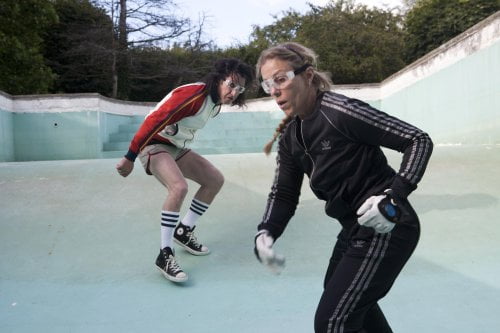This Must Be the Place

Retired goth rocker Cheyenne (Sean Penn) spends his days bumping around his Dublin estate, avoiding his cheerful wife Jane's (Frances McDormand) efforts to get him engaged, meeting sixteen year-old fan-turned-friend Mary (Eve Hewson) daily for coffee at a shopping mall. He's feeling depressed when he gets the call that the father he hasn't spoken to in 30 years is dying. Arriving in New York too late because of his fear of flying, Cheyenne discovers that his dad was obsessed with hunting the Nazi camp guard who tormented him in Auschwitz and decides to take up the cause in a trip across America in "This Must Be the Place."
Laura's Review: A-
After his Italian political satire "Il Divo," cowriter (with Umberto Contarello)/director Paolo Sorrentino makes an abrupt turn with a magical stay-at-home turned road movie about the often fraught and fragile connections between parents and their children and how these relationships shape us. This film about a Robert Smith-like rocker hunting a Nazi war criminal, while about that, is more about everything but that. Featuring a uniquely endearing performance from Penn and stunning widescreen photography from Luca Bigazzi ("Il Divo," "Certified Copy"), "This Must Be the Place" is one of the most unexpectedly delightful films of the year. Sorrentino takes his time establishing his protagonist in his aimless lifestyle before things get really weird. Cheyenne (the name was chosen as a male counterpart to Siouxsee Sioux's) lives in a pristine Georgian estate, goes through an elaborate hair and makeup routine every morning, then walks through the streets trailing a two-wheeled shopping cart. He listens to a band in a mall with Mary until they begin to play one of his songs and encourages the clean cut barista crushing on Mary to persist even though the goth girl discourages. They visit the grave of the Keough sons and leave flowers, despite being told they are not welcome. All in all, Cheyenne is an exotic oddity cherished by but also accepted by the community. His wife Jane still works as a local firefighter (he's astonished when he encounters her up high in a crane bucket) and obviously dotes on him. He wouldn't think of looking at another woman (and has great chemistry with McDormand). The two look comical playing a rousing game of hand ball in their empty inground pool. The themes of the film begin to creep in around the edges. 'Rock stars shouldn't have kids because you run the risk of your daughter becoming a wacky stylist,' Cheyenne propounds at one point. Mary is mistaken for his. Mary's mother (Olwen Fouéré) has gone half mad, waiting, smoking by an upstairs window since her son Tony left without warning. When he wonders aloud why he never picked up smoking given all his past vices, she tells him children never have the urge. On his first attempt to cross the Atlantic, we see him strapped in in the plane's cockpit, like a child in a booster seat. In New York, when Nazi hunter Mordecai Midler (Judd Hirsch) asks about his relationship with his father, Cheyenne talks about his rebellion at fifteen (still, apparently, going on) and how his father never loved him. A startling moment of self revelation comes during a reunion with David Byrne (The Talking Head as himself). As he sets out across the country to such remote areas as Bad Axe, Michigan; Alangordo, New Mexico and Huntsville, Utah, he listens to a demo tape with songs about home and finds the wife (Joyce Van Patten, "Grown Ups"), daughter (Kerry Condon, "Intermission," "The Last Station") and grandson (Grant Goodman, "The Campaign") of camp guard Aloise Lange (Heinz Lieven), a family with many parallels to his own. Often Cheyenne's conclusions are both pointed and laugh out loud funny, such as his observation that Nazi hunting follows the same rules as show business (go where the publicity is). Penn's characterization is that of a fragile, sensitive soul, one with a high, hesitant voice and almost apologetic tickle of a laugh. He shuffles like an old man (sciatica), frequently wears reading glasses and is constantly blowing the hair out of his face. He seems at once wise and a naif, capable of subterfuge on his quest yet pure of agenda. This contradiction is played wonderfully when he stops to apologize for splashing a bunch of German tourists roadside, then informing them that he did it on purpose nonetheless. The film is a catalog of wide open spaces, from Cheyenne's cavernous home to rural America. Byrne provides the score, as well as performing the titular song. There's something about this film that recalls "In Bruges" with its quirky road trip and the haunting death of a child, but that film embraced death where this one races towards life. Sorrentino and Penn have taken a bizarre leap together and uplift all of us in their wake.

